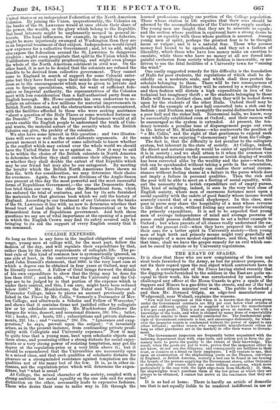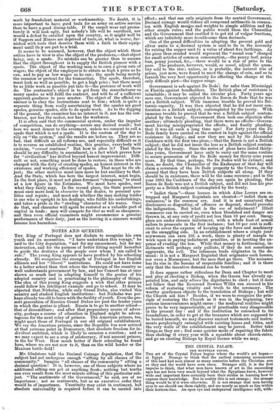THE ENA.VE OF SPADES.
IT is clear that those who are now complaining of the iron and steel tools furnished to the Army, as bad for pioneer purposes, do not fix their regard upon the real object which contractors have in view. A correspondent of the Times having stated recently that the digging-tools furnished to the soldiers in the East are quite un- equal to their work, his tale was corroborated by another, who challenged any officer at the Horse Guards to give a spade of the Sappers and Miners to a gas-fitter in the streets, and see :f the tool would stand fifteen minutes' real work. The public is shocked ; and then Mr. Bernard Gilpin, an edge-tool manufacturer of Wedgesmill, near Walsall, explains the reasons. "Few will feel surprised at this when it is known that the prices given under the Government contracts are fifty per cent below what articles of good and sufficient quality can be supplied at to leave the manufacturer a five per cent profit. This is not an opinion given at random, but with a knowledge of the trade, and what is charged by many firms of respectability for articles similar to those usually contracted for. The fundamental prin- ciple of Government contracts is bad, and encourages dishonesty, for what- ever the inspector rejects is condemned without the power of appeal to any other tribunal ; another reason why respectable manufacturers refuse (so long as other purchasers are in the market) to offer their wares to Govern- ment.
"The Government inspectors are frequently better acquainted with the tailoring department than with edge-tools, and seldom put in force the ne- cessary tests to prove the quality to the extent of their knowledge. The result, when the goods are put to work, proves that the inspectors either do not know, do not use due diligence, and consequently are faithless to their trust, or connive at a fraud on their employers. I will venture to say, that upon an examination of the shipbuilding yards on the Thames, elsewhere in England, or British America, scarcely a tool can be found in use bearing the brands of the persons supplying the Government stores, either Ordnance or Admiralty: (Of course there are some trifling exceptions, which more particularly is the case with the light edge-tools from Sheffield.) If, then, the shipwrights won't purchase them at the low prices at which they are always to be obtained, I cannot but arrive at the conclusion that they are bad."
It is as bad at home. There is hardly an article of domestic use that is not equally liable to be rendered indifferent in We or work by fraudulent material or workmanship. No doubt, it is more important to have good tools for an army on active service than to have a good dining-table. If the carpet wear out prema- turely it will look ugly, but nobody's life will be sacrificed, nor would a defeat be entailed upon the country, as it might well be if Sappers and Miners are deprived of tools, or, what is worse, fur- nished with tools that deceive them with a faith in their equip- ment until they are put to a trial. It seems to be assumed, however, that the object which these critics have in view is also the object of the producers,—that object being, say, a spade. No mistake can be greater than to assume that the object throughout is to supply the British pioneer with a spade. The object of the working man is to earn a given rate of wages; the object of the employer is to obtain as high a price as he can, and to pay as low wages as he can ; the spade being merely the occasion or pretext for the transaction. The spade, therefore, must look as well as possible, to get a high price ; but there must be as little work as possible put into it—the pretence of work will do. The contractor's object is to get from the manufacturer as many spades as will fulfil the contract, and will be of a sufficient apparent goodness to pass muster. The object of the official ex- aminer is to obey the instructions sent to him ; which is quite a separate thing from really ascertaining that the spades are good spades, genuine spades, able to do spade-work. As to the digging of the ground, the examiner has no interest in it, nor has the con- tractor, nor has the maker, nor has the workman. It is often said that the commercial system, under the impulse of competition, can do anything—secure any desired result; but here we must demur to the averment, unless we consent to call a spade that which is not a spade. It is the custom of the day to rely on "the system," and the results are before us. They are so bad, that difficult as all reforms are, and especially difficult as it is to reverse an established routine, this practice, everybody will exclaim, "cannot continue." But how to alter it ? That there should be any difficulty in amendment, is a fact which proves how far "civilization" has drifted beyond honest improvement. Diffi- cult or not, something must be done to restore, in those who are charged with the duty of creating spades, an honest interest in the existence and working efficiency of spades. That must be the ob- ject; the other motives must once more be but ancillary to that. And the State, which has here the largest interest, must begin. In the first place, it must not place foremost "cheapness," to stand at a low figure in the Estimates. We must have spades, cost what they fairly may. In the second place, the State purchaser must once more look to character in the dealer, to personal qua- lities and repute ; and must ask whether the man making tender is one who is upright in his dealings, who fulfils his undertakings, and takes a pride in the " sterling " character of his wares. Once do that, and character will again be restored as a valuable part of capital in trade ; men will compete for that as well as cheapness ; and then even official examiners might recommence a genuine performance of their duty, just as the leaving it a sinecure would become less hazardous.



































 Previous page
Previous page